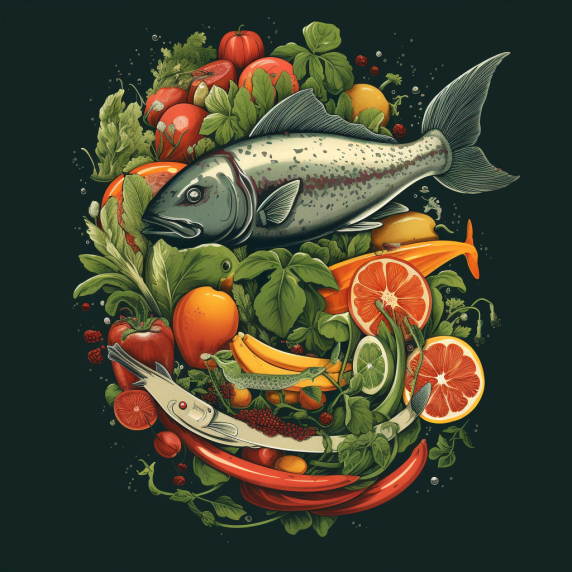Embracing a Plant-Based Lifestyle for Vibrant Aging: Nutritional Benefits and Practical Tips
As individuals age, maintaining a healthy lifestyle becomes increasingly important. One key aspect of healthy living for individuals over the age of 50 is adopting a plant-based diet. Plant-based diets, which focus on consuming primarily plant-derived foods, have gained significant popularity in recent years due to their numerous health benefits.
Healthy eating plays a crucial role in promoting overall well-being, and this is especially true for seniors. As we age, our bodies undergo various changes, and proper nutrition becomes essential to support optimal health. By embracing plant-powered meals, aging adults can experience a range of benefits that contribute to a vibrant and fulfilling life.
The Benefits of Plant-Powered Meals for Aging Adults
Plant-based diets offer a multitude of advantages for individuals over 50. Firstly, they are rich in essential nutrients such as vitamins, minerals, and antioxidants. These nutrients are vital for maintaining good health and can help prevent age-related diseases.
Additionally, plant-based diets are typically lower in saturated fats and cholesterol, which can contribute to heart disease and other cardiovascular conditions. By reducing the intake of animal products and focusing on plant-based alternatives, seniors can improve their heart health and reduce the risk of developing these ailments.
Furthermore, plant-based diets have been associated with a lower risk of obesity and type 2 diabetes. The high fiber content in plant-based foods helps regulate blood sugar levels and promotes healthy weight management. This is particularly important for seniors, as obesity and diabetes can lead to various health complications.
Moreover, plant-based diets have been linked to improved digestion and gut health. The abundance of fiber in plant-based foods supports a healthy digestive system, reducing the risk of constipation and other gastrointestinal issues commonly experienced by older adults.
Lastly, embracing plant-powered meals can contribute to a positive impact on the environment. Plant-based diets have a lower carbon footprint compared to diets that heavily rely on animal products. By choosing plant-based options, seniors can make a positive contribution to sustainability and the preservation of our planet for future generations.
In conclusion, adopting a plant-based diet can have significant benefits for individuals over the age of 50. From providing essential nutrients to reducing the risk of age-related diseases, plant-powered meals offer a holistic approach to healthy aging. In the following sections, we will delve deeper into the principles of plant-based diets, explore their nutritional benefits, address common concerns and misconceptions, and provide practical tips for embracing a plant-based lifestyle.
Understanding Plant-Based Diets
A plant-based diet is centered around consuming predominantly plant-derived foods while minimizing or eliminating the intake of animal products. It emphasizes the consumption of fruits, vegetables, whole grains, legumes, nuts, and seeds. By focusing on plant-based foods, individuals can reap numerous health benefits and support their overall well-being.
Variations of Plant-Based Diets
There are various variations of plant-based diets, each with its own level of flexibility regarding animal product consumption. Two common variations are vegetarian and vegan diets.
- Mediterranean Diet: The Mediterranean diet, although not entirely plant-based, places a strong emphasis on plant foods. It includes an abundance of fruits, vegetables, whole grains, legumes, nuts, and seeds, along with olive oil as the primary source of fat. It also includes moderate consumption of fish, dairy, and occasionally poultry or red meat.
- Whole Food Plant-Based Diet: This diet emphasizes whole, minimally processed plant foods and avoids or limits refined and processed foods. It includes fruits, vegetables, whole grains, legumes, nuts, and seeds while excluding or minimizing animal products and added fats, sugars, and refined oils.
- Vegetarian Diet: A vegetarian diet eliminates meat and fish but may include animal-derived products like dairy and eggs. There are different types of vegetarians:
- Lacto-ovo vegetarian: Consumes dairy and eggs but avoids meat and fish.
- Lacto-vegetarian: Includes dairy but avoids meat, fish, and eggs.
- Ovo-vegetarian: Includes eggs but avoids meat, fish, and dairy.
- Flexitarian Diet: A flexitarian, also known as a semi-vegetarian, primarily follows a vegetarian diet but occasionally includes small amounts of meat or fish. The focus remains on plant-based foods, with occasional flexibility for animal products.
- Vegan Diet: A vegan diet excludes all animal products, including meat, poultry, fish, dairy, eggs, and other animal-derived ingredients or by-products. Vegans rely solely on plant-based foods, such as fruits, vegetables, grains, legumes, nuts, and seeds.
Key Principles of a Plant-Based Diet for Seniors
When adopting a plant-based diet in later years, it’s important to consider the following key principles:
- Focus on Whole Foods: Choose minimally processed plant-based foods to maximize nutrient intake and minimize added sugars, unhealthy fats, and sodium.
- Ensure Adequate Nutrient Intake: Pay attention to consuming a variety of plant-based foods to obtain essential nutrients such as protein, calcium, iron, vitamin B12, and omega-3 fatty acids.
- Stay Hydrated: Drink plenty of water and include hydrating plant-based foods like fruits and vegetables in your diet.
- Listen to Your Body: Pay attention to hunger and fullness cues, and adjust portion sizes accordingly. It’s important to meet your individual nutritional needs.
- Consult a Healthcare Professional: If you have any specific dietary concerns or medical conditions, it’s advisable to consult a healthcare professional or registered dietitian before making significant dietary changes.
Nutritional Benefits of Plant-Based Diets for Seniors
Plant-based diets offer a wide range of essential nutrients that are beneficial for seniors. By incorporating a variety of plant-based foods into their meals, individuals over the age of 50 can enjoy numerous health advantages.
Essential Nutrients Found in Plant-Based Foods
Plant-based diets are rich in vitamins, minerals, and antioxidants that are vital for maintaining good health. Fruits and vegetables provide essential vitamins like vitamin C, vitamin A, and folate, which support immune function, vision, and cell growth. Whole grains, legumes, and nuts are excellent sources of fiber, protein, and healthy fats, which contribute to heart health and digestion.
Prevention of Age-Related Diseases
Research suggests that plant-based diets can help prevent age-related diseases such as heart disease, type 2 diabetes, and certain types of cancer. The abundance of antioxidants and phytochemicals found in plant-based foods can reduce inflammation, lower cholesterol levels, and regulate blood sugar levels. These benefits contribute to a decreased risk of developing chronic conditions commonly associated with aging.
Positive Impact on Overall Health and Well-being
Adopting a plant-based diet, such as the Mediterranean, Whole Food Plant-Based, or Flexitarian diets, can have a positive impact on overall health and well-being for seniors. These diets share some common benefits:
- Lower Risk of Chronic Diseases: The Mediterranean diet, with its focus on fruits, vegetables, whole grains, and healthy fats like olive oil, has been associated with a reduced risk of heart disease, stroke, and certain cancers. Similarly, the Whole Food Plant-Based diet, which emphasizes nutrient-dense, minimally processed foods, may help lower the risk of chronic diseases such as type 2 diabetes and hypertension.
- Weight Management: A well-balanced plant-based diet can help seniors maintain a healthy weight. The high fiber content in these diets promotes satiety, making it easier to control portion sizes and reduce overall calorie intake. This can be especially beneficial for seniors looking to manage their weight or prevent age-related weight gain.
- Improved Digestive Health: All three plant-based diets are rich in fiber, which aids in digestion and helps prevent constipation, a common issue among seniors. Consuming a variety of fruits, vegetables, whole grains, and legumes provides essential nutrients for digestive health.
- Enhanced Cognitive Function: Studies have suggested that plant-based diets, particularly those rich in fruits, vegetables, and healthy fats, may support brain health and cognitive function in older adults. These diets provide essential nutrients and antioxidants that can protect the brain from age-related decline.
Addressing Common Concerns and Misconceptions
Seniors may have certain concerns and misconceptions about following a plant-based diet, but with proper planning and understanding, these concerns can be addressed:
- Protein Intake: One common concern is meeting protein needs on a plant-based diet. However, all three plant-based diets mentioned here provide adequate protein from sources such as legumes, nuts, seeds, tofu, and other plant-based protein alternatives. Seniors can easily incorporate these foods into their meals to meet their protein requirements.
- Nutrient Deficiencies: Another concern is the potential for nutrient deficiencies, especially in vitamins B12 and D, which are primarily found in animal products. Seniors following plant-based diets can address this by incorporating fortified foods or considering supplements to ensure they meet their specific nutrient needs.
- Social and Cultural Factors: Some seniors may worry about social situations or cultural norms that revolve around meat-based diets. However, flexitarian diets allow for occasional consumption of meat, making it easier to navigate such situations while still maintaining a predominantly plant-based approach.
By emphasizing a variety of nutrient-rich plant foods and ensuring adequate intake of essential nutrients, seniors can enjoy the health benefits of a plant-based diet while meeting their individual preferences and needs. As with any dietary change, it is advisable for seniors to consult with a healthcare professional or registered dietitian to tailor a plant-based eating plan that suits their unique health requirements.
Practical Tips for Embracing a Plant-Based Lifestyle
Transitioning to a plant-based diet can be a gradual process that allows your body to adjust to the changes. Here are some practical tips to help you embrace a plant-based lifestyle:
Transition Gradually
Instead of making sudden and drastic changes to your diet, consider transitioning gradually. Start by incorporating more plant-based meals into your weekly routine. For example, you can designate certain days of the week as meatless days and experiment with new vegetarian or vegan recipes. This gradual approach will make the transition easier and more sustainable.
Incorporate More Plant-Based Foods
One of the key aspects of a plant-based lifestyle is incorporating a variety of plant-based foods into your daily meals. Focus on including fruits, vegetables, whole grains, legumes, nuts, and seeds in your diet. These foods are rich in essential nutrients and can provide the foundation for a healthy and balanced plant-based diet.
Explore Plant-Based Resources
There are numerous resources available to help you on your plant-based journey. Look for cookbooks, websites, and blogs that specialize in plant-based recipes for seniors. These resources can provide inspiration and guidance on creating delicious and nutritious plant-based meals. Additionally, consider joining online communities or forums where you can connect with others who are also embracing a plant-based lifestyle.
Try New Recipes
Experimenting with new recipes is a great way to discover the wide variety of plant-based options available. Look for recipes that are specifically designed for seniors, taking into consideration any dietary restrictions or preferences you may have. Incorporate different flavors, textures, and cooking techniques to keep your meals interesting and enjoyable.
Plan and Prep Ahead
Planning and prepping your meals in advance can make it easier to stick to a plant-based diet. Set aside some time each week to plan your meals, create a shopping list, and prepare ingredients in advance. This will help you stay organized and ensure that you have nutritious plant-based options readily available.
Stay Hydrated
Hydration is important for overall health, regardless of your dietary choices. Make sure to drink plenty of water throughout the day to stay hydrated. You can also incorporate hydrating plant-based beverages such as herbal teas, infused water, or homemade smoothies into your daily routine.
Seek Professional Guidance
If you have specific health concerns or dietary restrictions, it’s always a good idea to consult with a healthcare professional or a registered dietitian. They can provide personalized guidance and ensure that you are meeting your nutritional needs while following a plant-based lifestyle.
Remember, embracing a plant-based lifestyle is a journey, and it’s important to be patient with yourself. Celebrate small victories and focus on the positive changes you are making for your health and well-being.
The Role of Plant-Based Diets in Healthy Aging
Plant-based diets have been shown to play a significant role in promoting healthy aging and longevity. By adopting a plant-powered lifestyle, individuals over the age of 50 can experience a range of benefits that contribute to their overall well-being.
Supporting Healthy Aging and Longevity
Plant-based diets are rich in essential nutrients, antioxidants, and phytochemicals that can help combat age-related diseases and promote longevity. The abundance of vitamins, minerals, and fiber found in plant-based foods supports optimal health and can reduce the risk of chronic conditions such as heart disease, diabetes, and certain types of cancer.
Potential Benefits for Cognitive Function and Mental Well-being
Research suggests that plant-based diets may have a positive impact on cognitive function and mental well-being in later years. The nutrients found in plant-based foods, such as omega-3 fatty acids, antioxidants, and vitamins, have been linked to improved brain health and a reduced risk of cognitive decline. Additionally, the high fiber content in plant-based diets can support gut health, which is increasingly recognized as a crucial factor in mental well-being.
Impact on Maintaining Physical Fitness in Later Years
Plant-based diets can also contribute to maintaining physical fitness as individuals age. The abundance of plant-based protein sources, such as legumes, tofu, tempeh, and seitan, provides the necessary building blocks for muscle maintenance and repair. Additionally, plant-based diets are typically lower in saturated fats and cholesterol, which can help maintain cardiovascular health and support overall physical well-being.
By embracing a plant-based lifestyle, individuals over 50 can enhance their chances of leading a healthy, vibrant, and fulfilling life. The combination of nutritional benefits, potential cognitive advantages, and support for physical fitness makes plant-based diets a valuable tool in the pursuit of healthy aging.
Conclusion
Throughout this article, we have explored the power of plant-based diets for individuals over the age of 50. By adopting a plant-based lifestyle, seniors can experience numerous benefits that contribute to a vibrant and fulfilling life.
First and foremost, it is crucial to recap the key points discussed. Plant-based diets, which primarily consist of fruits, vegetables, whole grains, legumes, and nuts, offer a wealth of essential nutrients that support overall health and well-being. These diets are rich in vitamins, minerals, antioxidants, and fiber, which can help prevent age-related diseases and promote longevity.
Embracing a plant-based diet is especially important for individuals over 50. As we age, our bodies require more nutrients to maintain optimal health. Plant-powered meals provide the necessary nourishment while being gentle on the digestive system and reducing the risk of chronic conditions such as heart disease, diabetes, and certain types of cancer.
It is essential to encourage readers to explore the benefits of plant-powered meals for a vibrant and fulfilling life. By incorporating more plant-based foods into their daily meals, seniors can experience increased energy levels, improved cognitive function, and enhanced mental well-being. Plant-based diets also play a significant role in maintaining physical fitness in later years, supporting muscle strength, joint health, and overall mobility.
In conclusion, embracing a plant-based diet is a powerful choice for individuals over 50. By prioritizing healthy eating habits and incorporating more plant-powered meals into their lives, seniors can lead healthy, vibrant, and fulfilling lives. We encourage you to explore the resources and recipes available on sporting.com to embark on your plant-based journey and experience the transformative benefits it can bring.
Related FAQ
What is a plant-based diet?
A plant-based diet is centered around consuming predominantly plant-derived foods while minimizing or eliminating the intake of animal products. It emphasizes the consumption of fruits, vegetables, whole grains, legumes, nuts, and seeds.
Are plant-based diets suitable for seniors?
Yes, plant-based diets offer numerous health benefits for individuals over the age of 50. They provide essential nutrients, reduce the risk of age-related diseases, support digestion, and promote overall well-being.
Can plant-based diets meet the protein needs of seniors?
Yes, plant-based diets can provide all the necessary protein for seniors. Legumes, tofu, tempeh, and seitan are excellent plant-based protein sources that can be incorporated into meals.
Do plant-based diets lead to nutrient deficiencies in seniors?
With proper planning and a well-balanced approach, plant-based diets can provide all the necessary nutrients for seniors. It is important to ensure adequate intake of vitamins B12 and D, which are primarily found in animal products.
How can seniors transition to a plant-based lifestyle?
Seniors can transition gradually by incorporating more plant-based meals into their weekly routine, exploring plant-based resources, trying new recipes, planning and prepping meals ahead, and seeking professional guidance if needed.
Key Take Away
- “Plant-Based Lifestyle for Vibrant Aging: Nutritional Benefits and Practical Tips” – This title incorporates relevant keywords, including “plant-based lifestyle,” “vibrant aging,” “nutritional benefits,” and “practical tips,” which can help improve search engine visibility for the article.
- “Healthy Aging with Plant-Powered Meals: Benefits for Seniors” – This subheading uses keywords like “healthy aging,” “plant-powered meals,” and “benefits for seniors,” further optimizing the article for SEO.
- “Variations of Plant-Based Diets: Understanding Options for Seniors” – This section title includes keywords like “variations of plant-based diets,” “understanding options,” and “seniors,” making it SEO-friendly and attracting relevant searches.
- “Nutritional Benefits of Plant-Based Diets for Seniors: Supporting Optimal Health” – This subheading uses keywords such as “nutritional benefits,” “plant-based diets for seniors,” and “supporting optimal health,” enhancing the article’s SEO potential.
- “Practical Tips for Embracing a Plant-Based Lifestyle: Gradual Transition and Recipe Exploration” – This section heading includes relevant keywords like “practical tips,” “embracing a plant-based lifestyle,” and “recipe exploration,” making it more likely to be found in relevant searches.
Glossary
- Plant-Based Diet: A dietary approach that focuses on consuming predominantly plant-derived foods, such as fruits, vegetables, whole grains, legumes, nuts, and seeds, while minimizing or eliminating the intake of animal products.
- Antioxidants: Compounds found in plant-based foods that help neutralize free radicals in the body, reducing oxidative stress and protecting cells from damage. They are beneficial for overall health and may help prevent age-related diseases.
- Phytochemicals: Bioactive compounds found in plants that have potential health benefits, including antioxidant and anti-inflammatory properties. They play a role in supporting optimal health and well-being.
- Whole Food Plant-Based Diet: A type of plant-based diet that emphasizes consuming whole, minimally processed plant foods and avoiding or limiting refined and processed foods, animal products, and added fats, sugars, and oils.
- Flexitarian Diet: A semi-vegetarian diet that primarily follows a vegetarian pattern but occasionally includes small amounts of meat or fish. The focus remains on plant-based foods, with occasional flexibility for animal products.
- Omega-3 Fatty Acids: Essential fatty acids found in certain plant-based foods, such as flaxseeds, chia seeds, and walnuts, that play a crucial role in brain health, heart health, and inflammation regulation.
- Mediterranean Diet: A diet inspired by traditional eating habits in Mediterranean countries that emphasizes plant-based foods, such as fruits, vegetables, whole grains, and healthy fats like olive oil, along with moderate consumption of fish, dairy, and poultry.
- Lacto-Ovo Vegetarian: A type of vegetarian who consumes dairy and eggs but avoids meat and fish.
- Fortified Foods: Foods that have been enriched with additional nutrients, such as vitamins and minerals, to address potential nutrient deficiencies in plant-based diets.
- Cognitive Function: The ability of the brain to perform various mental processes, including thinking, learning, memory, and problem-solving. Plant-based diets may have a positive impact on cognitive function and brain health in seniors.
Additional Resources
Books:
- The Blue Zones, Second Edition: 9 Lessons for Living Longer From the People Who’ve Lived the Longest by Dan Buettner
- The China Study by T. Colin Campbell and Thomas M. Campbell II
- How Not to Die by Michael Greger, M.D.
- Prevent & Reverse Heart Disease by Dean Ornish, M.D.
- The End of Heart Disease by Caldwell Esselstyn, Jr., M.D.
- The Starch Solution by John Robbins
- Proteinaholic by Garth Davis, M.D.
- The Plant-Based Solution by Brenda Davis, R.D.N. and Vesanto Melina, M.S., R.D.
- Breaking the Food Seduction by Neal Barnard, M.D.






